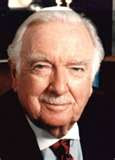
The most trusted man in America died recently and it has gotten me thinking about trust and credibility.
As a young boy, I wasn't much interested in the news, but I still remember Walter Cronkite. He had that "Uncle Walter" personality that everyone liked and found highly credible.
Flash forward to a recent networking meeting I attended. I met a man who initially expressed an interest in using Twitter and other social media platforms to generate leads and attract new business.
He was, I assume, looking forward to a quick fix, because as soon as I described the concept of building relationships, trust and credibility, his eyes flicked away from me and he lost interest.
Apparently our networking group didn't meet his need for a quick fix either, because he never showed up again.
Which leads me to what I call the "Walter Cronkite Model for Social Networking." It simply means that if you focus on building trust and credibility, you will find your selling becomes a lot easier.
Or to put it another way:
If you put your efforts and focus on building trust and credibility, the sales will follow.
Here's the point: Social media is not terribly effective in making quick, one time sales, which is why people like my new acquaintence aren't interested. But it is VERY effective in starting and developing relationships that involve trust and credibility.
And frankly it just doesn't take that much extra effort and time.
Let's start with this observation: No other tool exists that can enable a business person to make new contacts faster than social media. Twitter, Facebook and YouTube are like magnets for attracting new contacts who have like interests.
But making new contacts is only the first step. The next step is to do all that relationship building - trust - credibility stuff (the stuff a lot of business people are unwilling to do in their quest for instant results) but that offer huge payoffs not very far down the road.
I'll use my networking group as an example of how to build relationships with online social networking. This group encourages us to have "one-on-one" meetings with one another to get to know them as individuals and their businesses. The goal of these meetings is to encourage us to refer business to each other.
That "face time" is what Walter Cronkite did each and every night on his news broadcasts. We got to know him and trust him simply because we brought him into our living rooms every evening. Day by day, Cronkite built up "social capital" with his viewers by being good at his work, offering unbiased news and simply "being there" consistently over time.
Then the time came for him to actually "sell something." This occurred when he departed from his normal practice of just offering straight news and presented his famous commentary on the futility of the Vietnam War. The impact of this editorial was profound BECAUSE it came from Walter Cronkite, a man America knew and trusted, and also BECAUSE he was not someone who offered his own views very often (in other words, he kept his commercial messages to a minimum).
Another example of building trust and credibility is something I read in an article called, "Is “closeness to customer” a new measure of success?" Research has found that companies with larger market share and profitability share a common trait: about five times the employees of the successful firms have direct contact with customers compared to less successful companies.
Specifically, only 5 to 10% of employees of typical companies have regular customer contact. But the more successful companies have about 25 to 50% employees with regular customer contact. The point of the article is simply the fact that being close to your customers pays off.
This sets up a terrific argument for using social media to build trust and credibility in order to make the actual sales process easier. It also points out the error of hit-and-run marketing that seeks a quick fix.
Going back to the man who seemed unimpressed by our networking group, we often have people who show up once or twice and then vanish. But the people who actually get business from such groups are the ones who invest themselves in the groups and each other.
These "quick fix" visitors would be far more successful if they modeled Walter Cronkite and spent more time building trust and credibility and only occasionally offered a sales message (like his rare editorial on Vietnam). When one does this, these rare sales messages have much, much more impact.
If you like this article:
----------------------------------------------------
COPYRIGHT © 2009, Charles Brown Add to Onlywire

0 comments:
Post a Comment